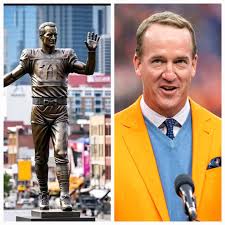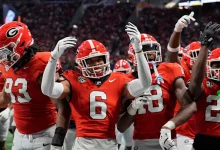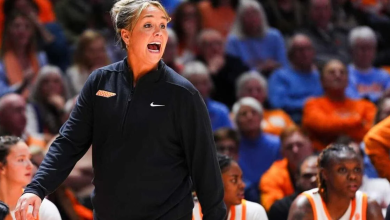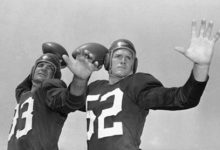Knoxville immortalizes Peyton Manning with a statue—a lasting tribute to a humble legend built on love, hard work, and Tennessee pride.

On a crisp fall day in Knoxville, Tennessee, thousands gathered near Neyland Stadium to witness the unveiling of a statue honoring one of the University of Tennessee’s most iconic figures—Peyton Manning. The bronze monument captures Manning in his Tennessee Volunteers uniform, forever immortalizing a player whose impact on the university, the sport, and the community transcends mere athletic achievements.
Though Peyton Manning famously resisted the idea of having a statue erected in his honor, claiming his journey was never about personal glory, Tennessee Vols football and its passionate fanbase could not help but recognize the man who gave everything to the team and the state. Manning’s legacy is now permanently cast in bronze, a testament to the values he embodied throughout his career: love for the game, relentless hard work, and deep Tennessee pride.
This article explores the story behind the statue, Manning’s journey, and the profound legacy that Knoxville celebrates.
Peyton Manning: More Than Just a Quarterback
Before the bronze statue stood proud, Peyton Manning was a young man with a dream—a dream rooted deeply in the traditions of Tennessee football and shaped by the values of discipline and humility. Manning’s time as the Tennessee Volunteers’ starting quarterback from 1994 to 1997 was marked by incredible personal and team achievements, setting school records and inspiring an entire generation of football fans.
Manning’s legacy, however, extends far beyond statistics and wins. He was known for his meticulous preparation, intellectual approach to the game, and leadership that motivated his teammates to rise above challenges. Coaches and teammates repeatedly praised his work ethic and dedication, qualities that propelled him to become one of the most decorated players in both college and professional football.
The Roots of Tennessee Pride
Manning’s story is inseparable from Tennessee itself. Born in New Orleans but raised in a family steeped in football tradition, Peyton grew up watching his father Archie Manning, a former NFL quarterback, and his brother Eli, who would also go on to become a Super Bowl champion. However, it was at Tennessee where Peyton began carving out his own unique identity.
From his first day on campus, Manning embraced the Volunteers’ culture—the fervor of Neyland Stadium, the intensity of SEC football, and the passionate fanbase that rallies around the team through highs and lows. For Manning, playing for Tennessee wasn’t just a stepping stone; it was a calling.
His commitment to the state and its people was evident in countless ways—whether mentoring younger players, engaging with fans, or embodying the values Tennessee holds dear. His success inspired pride and unity across the state, cementing him as a figure larger than football alone.
The Making of the Statue: Honoring a Legacy
Despite his preference for humility, the university and community felt compelled to honor Manning’s extraordinary contributions. The statue was commissioned not just as a celebration of athletic prowess, but as a symbol of the ideals Manning represents.
Crafted by renowned sculptors who worked closely with Manning and those who knew him best, the statue captures a moment frozen in time—Manning poised at the line of scrimmage, eyes focused downfield, embodying determination and leadership. The attention to detail is striking, from the wrinkles in his jersey to the confident set of his jaw.
The statue’s placement near Neyland Stadium—a cathedral of Tennessee football—ensures that it will greet thousands of fans every game day, serving as a constant reminder of what dedication, integrity, and love for the game look like.
The Unveiling Ceremony: A Community Celebration
The unveiling of the statue was a deeply emotional event that brought together fans, former teammates, coaches, and Peyton Manning himself. The air was filled with reverence and gratitude as speakers shared stories that highlighted not only Manning’s skills but his character.
Former Tennessee coach Phillip Fulmer recalled Manning’s incredible work ethic and the way he elevated everyone around him. Teammates spoke of his quiet leadership, his ability to stay calm under pressure, and the way he treated everyone with respect.
Manning, true to form, downplayed the statue’s significance, focusing instead on the team and the fans who made his journey meaningful. “This statue is not about me,” Manning said during his speech. “It’s about all the people who supported me, believed in me, and worked alongside me. It’s about Tennessee football, and that’s what matters most.”
Love, Hard Work, and Tennessee Pride: The Core of Manning’s Legacy
The statue isn’t just a physical tribute—it represents the values that Peyton Manning has come to embody throughout his career.
Love
Manning’s love for football and for Tennessee runs deep. This passion was the fuel that carried him through grueling practices, tough losses, and the relentless pressure of competing at the highest levels. His love extended beyond the field, manifesting in his charitable work and his role as a mentor for young athletes.
Hard Work
Countless hours of preparation defined Manning’s approach to football. He was known for his rigorous study of film, precise attention to detail, and relentless drive to improve. This dedication transformed him into a quarterback renowned for his intelligence and adaptability—a player who could outthink defenses and lead his team to victory.
Tennessee Pride
Manning’s connection to Tennessee is more than symbolic. It is a bond forged through shared experiences with fans and teammates, through enduring the pressures of SEC football, and through representing the state on a national stage. The pride that Manning felt—and inspired—resonates in the hearts of Tennessee fans, making his statue a beacon of state pride.
Impact Beyond the Field: Inspiring Future Generations
The Peyton Manning statue is not only a celebration of past achievements but a source of inspiration for future Volunteers. Young athletes visiting Neyland Stadium now have a tangible connection to a figure who exemplified excellence, humility, and commitment.
Coaches and educators have spoken about the statue’s role in motivating players to embody the same values Manning displayed. It stands as a silent mentor, encouraging discipline, resilience, and love for the game.
For fans, the statue evokes memories of thrilling games, shared victories, and the unbreakable spirit of Tennessee football. It’s a reminder that greatness is built on a foundation of character as much as talent.
The Broader Cultural Significance
Beyond sports, Peyton Manning’s story and statue reflect themes that resonate deeply in American culture: perseverance, humility, and giving back. In an era where celebrity often overshadows substance, Manning’s legacy offers a refreshing example of how success can be grounded in integrity and service.
His charitable efforts, including his foundation and support for children’s hospitals, underscore this commitment to using his platform for good. The statue, while a celebration of athletic accomplishment, also honors these broader contributions.
Reflections on a Humble Legend
As Peyton Manning’s bronze likeness stands tall in Knoxville, it offers a powerful lesson: that true greatness is about more than individual accolades. It’s about love for the community, the discipline to work tirelessly, and the pride in representing something larger than oneself.
Manning’s legacy, now permanently etched in the heart of Tennessee football, will continue to inspire fans and players alike for generations to come. The statue serves as a lasting tribute to a humble legend—a man who never sought the spotlight but earned it through passion, perseverance, and pride.
The Peyton Manning statue in Knoxville is more than an artwork; it is a symbol of a remarkable journey. It honors a man whose love for Tennessee, tireless work ethic, and humble spirit left an indelible mark on college football and the community he so dearly loves.
For those who gather near Neyland Stadium, the statue is a place to remember, reflect, and be inspired—a fitting tribute to a true Tennessee legend whose legacy will endure forever.









